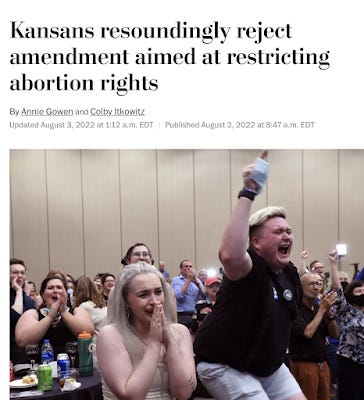"Earthquake: Deep Red Kansas Protects Abortion"
Huffington Post Banner Headline
Kansas voters voted no. They declined to change the Kansas state constitution.
Abortion rights advocates are thrilled.
The Kansas Supreme Court had ruled in 2019 that their state's constitution protected a woman's right to an abortion up to the time of possible viability of the fetus. The Kansas Constitution has a Bill of Rights. It begins with words from the Declaration of Independence: "All men are possessed of equal and inalienable natural rights, among which are life, liberty, and the pursuit of happiness." Because in Kansas a woman can pursue happiness, its Supreme Court said a woman has personal privacy and body autonomy. How could a woman pursue happiness without those? Alas, pursue happiness isn't in the U.S. Constitution, so the current U.S. Supreme Court doesn't find "privacy" implied in the penumbras of its language.
Kansas voters understood that abortion was heavily regulated in their state. The Kansas' legislature had put a 24-hour waiting period for getting an abortion. They inserted a state-mandated notice that abortions may increase the risk of breast cancer. Kansas edged up the timing of abortion bans from the Roe standard, defining viability as 20 weeks of gestation and 22 weeks from the last menstruation. There are only five abortion-providing clinics in the state.
Voters understood Kansas to be the site of especially-aggressive anti-abortion activity. The national anti-abortion group, Operation Rescue, moved its headquarters to Wichita. The city had been the site of daily "Summer of Mercy" demonstrations and protests that blocked the doors of a clinic. George Tiller, a doctor who provided abortions, was murdered at his Wichita church by an anti-abortion activist.
Kansas voters also know abortion access was under continuing pressure. Neighboring states had passed laws placing a total ban on abortion, starting at the moment of conception. Kansas legislators had introduced bills to ban all abortions if and when the voters passed the amendment changing the Kansas constitution. That became a point of controversy. Advocates for the constitutional amendment denied the vote necessarily meant a total abortion ban, but the idea was out there as a distinct possibility. Look at Oklahoma and Missouri. Kansas would be next.
Voters said "no." A "no" vote maintained the status quo.
This is a happy morning for abortion rights advocates. One implication from this vote is that red-state legislatures are over-playing their hand. They are scaring people. Polling missed this. Polls suggested anti-abortion voters were energized by the Dobbs decision while pro-choice voters were not. Not so. This was even with the yes-vote home court advantage. The legislature scheduled the vote for August 2, a primary election date, when there are lots of contested Republican races.
The 2022 midterm election may not be the predicted Republican sweep. The usual mid-term oscillation away from the presidential party normally takes place under the condition of an empowered president leading an agreeable Congress. There was no Democratic sweep in 2020. Biden appears physically and politically feeble. Joe Manchin, not Biden, appears to determine policy. Mitch McConnell confounds Democrats at every turn.
Biden and the Democrats are not political Godzillas. The Supreme Court is. Red-state legislatures are. The powerful disruptive force in American politics is Trump, not Biden. Biden isn't touting the influence of his endorsements. Trump is. The frightening agent of government power was the Kansas legislature. God knows what they might try. Voters said stop.
This vote was a vote for abortion rights. The vote was also a vote against runaway state legislatures. That is a different thing, and a warning to both blue and red states with supermajorities in their legislatures.






What do you know there is middle ground and its killing liberals.
Well now, isn't that interesting...I don't think we are in Kansas anymore Toto,,,